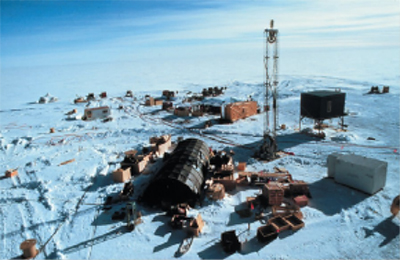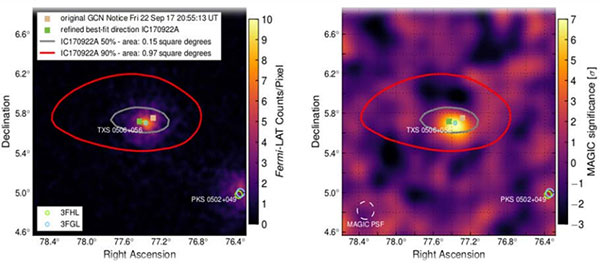News
International Team IceCube Finds Energy Source of Neutrino Updated in September 2018
The international research team IceCube publicized that the observational facility at the south pole captured a high-energy neutrino which had traveled from 4 billion light years away. The team had also discovered a celestial body which was the source or "parent-particle" of this neutrino. The team hopes to clarify how the cosmic rays from the neutrino were emitted. The research paper was published on July 13 in the electronic version of Science.
The IceCube is an international joint project involving 49 research institutes across 12 countries, including Chiba University, the United States, Germany, and Sweden. According to Chiba University and other sources, the IceCube team detected a high-energy neutrino in the Antarctic Observatory at 5:54 a.m. on Sept. 23. The facility has about 5,000 detectors (multiplier tubes) within 1.4-2.4 kilometers of ice below the surface. On rare occasions, multiplier tubes emit light when they encounter a neutrino.
As soon as the IceCube team reported the detection of this neutrino to researchers around the world, telescopes and astronomical satellites across the world had unanimously observed the direction of the constellation Orion where the neutrino traveled through. As a result, the Higashi-Hiroshima Observatory’s Kanata Telescope had quickly detected strong gamma rays emitted from an astronomical celestial body, called "Blazar," from 4 billion light-years away. The team also analyzed in detail, the results obtained from Fermi-LAT (Large Area Telescope), a telescope equipped with a gamma-ray astronomy satellite. It was launched as an international joint project by 6 countries, including Japan. Observation results from MAGIC (Major Atmospheric Gamma Ray Imaging Cherenkov Telescope) located at La Palma Island, Spain were also analyzed. Results verified that the Blazar was a high-energy source of the neutrino.
The Blazar feeds on energy coming from the center of a giant black hole. It is an extremely bright type of shining galaxy with an "activity galactic nucleus." It is an important subject of astronomical research still covered in mystery.
Neutrinos are one of the smallest particles that make up a substance, and are formed when a cosmic ray collides with light or gas. It is difficult to detect because it can go through almost all types of materials. Masatoshi Koshiba, Professor Emeritus at University of Tokyo, first observed neutrinos in 1987 from a supernova explosion which occurred in the Large Magellan Nebula 160,000 light years away. He won the 2002 Nobel Prize in Physics for this achievement.
https://science.sciencemag.org/content/361/6398/115
http://www-ppl.s.chiba-u.jp/index_e.html









